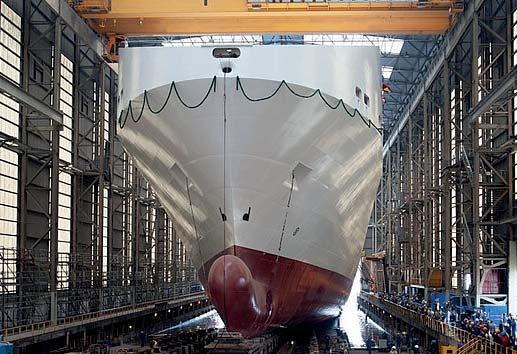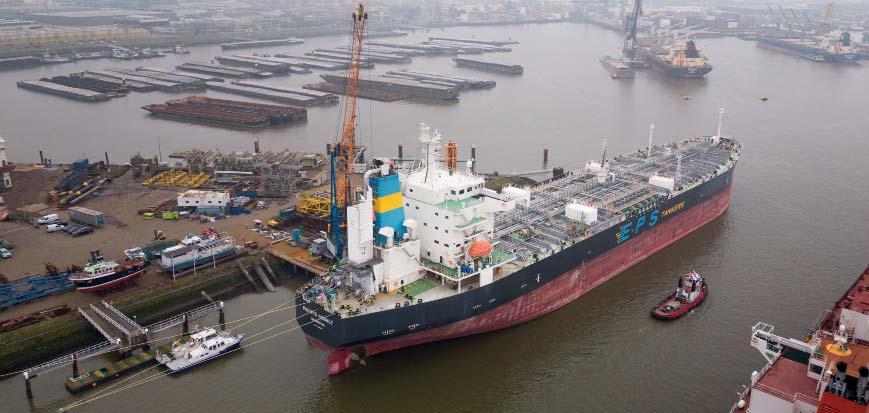
2 minute read
LNG BARGE DEAL BOOSTS GERMAN YARD
Resurgent German shipbuilder Flensburger SchiffbauGesellschaft(FSG) has landed a major deal for a series of LNG bunker tankers, writes David Tinsley. Three 4,500m3-capacity newbuilds have been ordered by a consortium made up of the German companies
The contract has been backed by EUR62m ($66.3m) funding from the German Federal Government. The grant is predicated on the need to promote investments supportive of the shipping industry’s energy transition by way of a switch to alternative fuels, and has also been influenced by the extent of German technological involvement.
The nascent flotilla will strengthen the German and European bunkering infrastructure for LNG, liquefied bio-methane(LBM) and, further down the line, synthetic natural gas as low-carbon or carbonneutral fuel for shipping. The bunker vessels have also been designed to facilitate future adaptation to an ammonia bunkering role. All three ships are expected to be in service by the end of 2025.
FSG’s latest completion is the 210m ro-ro freight vessel Tennor Ocean. Towards the end of January, the trailership sailed from Flensburg for final work at Lloyd Werft’s Dock 3 in Bremerhaven over a week-long sojourn prior to sea trials. The twin-engined vessel’s launching in June 2022 was the first since the yard’s re-start, following its purchase out of insolvency by the Lars Windhorst-headed company Tennor Holding in 2020.

Arranged for a 279-trailer intake, Tennor Ocean has been built to the group’s own account, and is based on FSG’s RoRo 4100 design, which had previously been produced in series for various owners. The vessel features a newly-developed folding mast section that meets the 40m air-draught condition needed for transit of the Kiel Canal. An option is held on a sister newbuild, also with a view to deployment in the charter market.
The subsequent project at the Flensburg yard is an LNG dual-fuel powered, 3,800 lane-metre ro-ro freight carrier ordered by the Australian operator SeaRoad.
For FSG, the latter provides an LNG engineering link to the new contract for bunker vessels. Meanwhile, Amsterdam-based Titan has this month also acquired two small-scale LNG carriers from Seapeak, the Canadian gas transportation company formerly known as Teekay LNG Partners. The 152m, 12,000m3-capacity vessels will be retrofitted so as to confer an LNG bunkering role, complementing the capability for coastwise distribution of LNG and LBM in European trade.
Eastern Pacific Shipping (EPS) has announced the successful installation of Value Maritime’s (VM) Filtree system onboard its managed vessel M/T Pacific Cobalt in Rotterdam.
The supplier claims that the installation is the of its kind aboard an ocean-going vessel, and represents a major step forward towards the wider industry-wide adoption,
The installation of the prefabricated gas filtering system commenced in mid-January 2023 in Rotterdam. It took 17 days to complete and was managed jointly by EPS’s and VM’s sea and shore staff

The Filtree system, which filters sulphur and 99% of particulate matter, includes VM’s Carbon Capture & Storage (CCS) module that can capture up to 40% of CO2 emissions from the vessel’s main and auxiliary engines.
The CO2 is captured in a special chemical that is stored in an onboard tank that during the retrofit has been recoated and converted for this purpose. The tank now provides sufficient storage space to capture more than 200 tonnes of CO2 in a single voyage. Once the tank is full, the chemical will be pumped out in port and delivered to end users.
Value Maritime notes that the CO2 can be sold to commercial consumers of carbon dioxide. In the Netherlands, the commercial agriculture sector uses carbon dioxide in the greenhouse sector, while synthetic fuel producers are expected to become an increasingly important end-user market.
HMM boxship order
HMM has placed orders for 7 x 9,000 teu container vessels with Hyundai Samho Heavy Industries, and 2 x 9,000 teu vessels with HJ Shipbuilding and Construction (HJSC). Both orders specify dual-fuel engines capable of operating on methanol. The series of 9,000 teu container vessels is expected to be delivered between 2025 and 2026. The vessels are intended to be operated on trans-Pacific trade lanes and the Asia-India routes.







